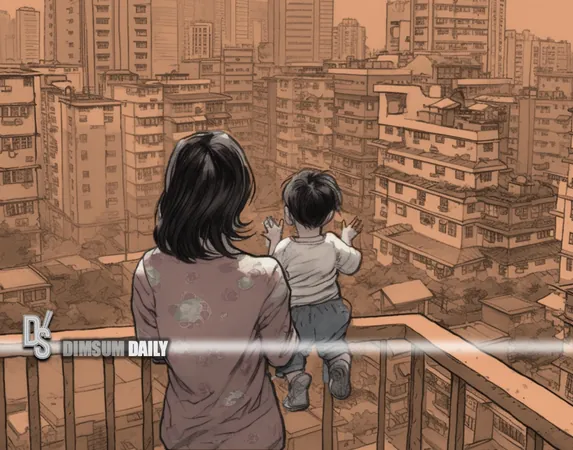
A Heartbreaking Wake-Up Call: The Silent Suffering in Hong Kong's Streets
2024-12-20
Author: Wai
A Heartbreaking Wake-Up Call: The Silent Suffering in Hong Kong's Streets
On a tragic night in December 2024, the bustling city of Hong Kong witnessed a shocking incident that once again exposed the dark underbelly of its society. At Tai Ping Estate in Sheung Shui, a grandmother and her one-year-old grandson plummeted to their deaths, leaving behind a story that resonates with despair in a city synonymous with relentless progress. But amidst the chaos of urban life, how often do we truly listen to the cries for help surrounding us?
The grandmother, aged 47, was grappling with severe financial woes, openly expressing her unhappiness and making arrangements for her 20-year-old son before her tragic act. This was not a silent plea; it was a desperate cry in a metropolis where turning a blind eye has become a survival strategy. The chilling question lingers: how many of her neighbors heard her plight, yet chose to look the other way?
This incident transcends a mere family tragedy; it mirrors the deep emotional paralysis plaguing Hong Kong's residents. We walk past the needy sprawled on our streets, swiftly scrolling past news of distress while remaining emotionally detached. In a city that should be teeming with compassion, our indifference is shockingly sophisticated, while simple acts of kindness stand out as remarkable.
In the wake of this tragedy, the Social Welfare Department's standard response—filled with "deep concern" and promises of "appropriate support"—rings hollow. In Hong Kong, where vulnerability is equated with shame, the real question is how many more lives must be lost before we dismantle a system built on waiting for cries for help that few dare to vocalize?
Behind every window in places like Tai Ping Estate lies a story begging to be heard. Families struggling to keep their heads above water, patients coping alone with grief, and young mothers silently weeping – these tales of loneliness weave through our towering skyline. The truth is stark: we have created an environment where financial hardship leads to desperation, not because resources are lacking, but because the stigma surrounding help-seeking is insurmountable.
The layers of this sorrow run deeper than the headlines portray. With modern family structures increasingly fracturing, this grandmother’s situation illustrates a broader societal issue, calling into question the very foundations of community support once celebrated in Chinese culture. Where were the neighbors? Where was the community solidarity that should have been there at such a critical moment?
We often find ourselves rationalizing these tragedies. The blame rests on those who don't seek help, or we dismiss available resources with empty assurances. Such sentiments overlook a painful reality: in a city obsessed with success, vulnerability is treated as a flaw, while financial challenges are dismissed as personal failures.
Our response pattern to these calamities is grimly predictable. Politicians facilitate discussions, social workers raise awareness, and ultimately, we slip back into a cycle of indifference, relegating these tragedies to mere footnotes in our collective narrative until the next painful event jolts us awake—if only briefly.
Perhaps the most unsettling aspect of this pattern is how quickly we normalize the horror. The heartbreaking deaths of a grandmother and her grandchild fade into the background, turning into fleeting topics of discussion over dim sum before we move on to more mundane matters, such as property values. We’ve developed an emotional callus thick enough that even the loss of a young life barely nudges us from our daily routines.
Imagine our elderly, toiling into their 80s, their faces lined with the stories of hardship, as the younger generation, cocooned in their own worlds, passes by without a glance. Observe how domestic helpers, who go invisible when deemed out of utility, occupy public spaces only to be acknowledged when needed. Witness families confined to suffocating living conditions that surpass the limits of logic and morality—these scenarios depict not just an economic crisis but an ethical one as well.
Hong Kong prides itself on being a global metropolis, yet we have constructed a reality where productivity supersedes compassion. Urban development proceeds at the expense of countless individuals, and community ties consist merely of digital connections that bear little relevance to real human experiences.
The tragedy in Sheung Shui serves as a resounding alarm, begging us to confront the existential crisis hovering over our increasingly disconnected society. Each incident ought to awaken our conscience, forcing us to reflect on the heart of our urban identity. Until we shift our perspective and address the emotional toll stemming from our relentless pursuit of efficiency, these tragedies will not cease. They persist not due to an absence of solutions but because we have collectively chosen to remain emotionally numb.
The call to reconnect with our humanity has never been louder; the question remains—will we listen?





 Brasil (PT)
Brasil (PT)
 Canada (EN)
Canada (EN)
 Chile (ES)
Chile (ES)
 España (ES)
España (ES)
 France (FR)
France (FR)
 Hong Kong (EN)
Hong Kong (EN)
 Italia (IT)
Italia (IT)
 日本 (JA)
日本 (JA)
 Magyarország (HU)
Magyarország (HU)
 Norge (NO)
Norge (NO)
 Polska (PL)
Polska (PL)
 Schweiz (DE)
Schweiz (DE)
 Singapore (EN)
Singapore (EN)
 Sverige (SV)
Sverige (SV)
 Suomi (FI)
Suomi (FI)
 Türkiye (TR)
Türkiye (TR)